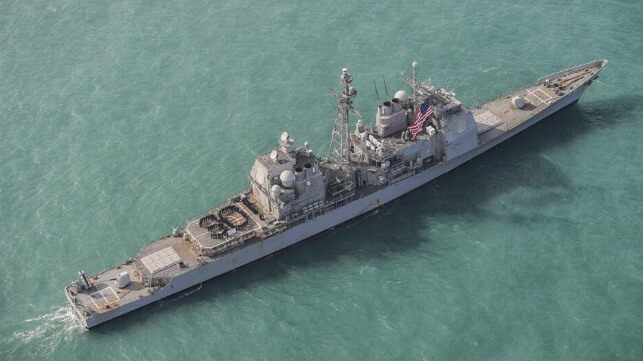US and China Trade Words After USS Chancellorsville Approaches Spratly

The U.S. Navy’s latest freedom of navigation operation in the South China Sea has sparked a new war of words between the Chinese and U.S. military. In a rare seen harshly worded statement from the U.S. Navy, they directly responded to the Chinese statement regarding the operation which accused the U.S. Navy of trespassing in Chinese waters without requesting permission to sail near the hotly contested Spratly Islands.
A small outcrop of mostly uninhabited islands, the Spratly archipelago has been the center of numerous disputes between China, its neighbors, and the also the United States. It is a rich fishing ground and may contain valuable resources of oil and gas while the Chinese also see it as militarily important. China, Taiwan, the Philippines, Vietnam, Malaysia, and Brunei all laying claim to some or all of the islands and regional reefs.
According to the U.S. Navy, the USS Chancellorsville, a Ticonderoga-class guided-missile cruiser transited the waters in accordance with international law and then continued to conduct normal operations in waters where high seas freedoms apply. The vessel approached the Spratly islands and at the end of the operation exited the area and continued to sail in the South China Sea.
“The PRC's statement about this mission is false,” the US Navy responded in a written statement. “USS Chancellorsville conducted this FONOP (Freedom of Navigation Operation) in accordance with international law The operation reflects our continued commitment to uphold freedom of navigation and lawful uses of the sea as a principle.”
Chinese officials asserted the U.S. had "seriously violated China's sovereignty and security." Their statement asserted that the USS Chancellorsville was in Chinese waters without the approval of the Chinese government. China’s Southern Theater Command said that it “organized air and naval forces to track, monitor and warn it off."
The U.S. Navy flatly rejected the assertions that China had taken actions to drive the ship from the area. An updated statement responding to the Chinese said “The PLA Southern Theater Command's statement is the latest in a long string of PRC actions to misrepresent lawful U.S. maritime operations and assert its excessive and illegitimate maritime claims at the expense of its Southeast Asian neighbors in the South China Sea. The PRC's behaviors stands in contrast to the United States' adherence to international law and our vision of a free and open Indo-Pacific region.”
The United States notes that it does not recognize the claims against the Spratly noting that the PRC, Vietnam, Taiwan, Malaysia, Brunei, and the Philippines each claim sovereignty over some or all of the Spratly Islands. The Navy rejects the fact that the PRC, Vietnam, and Taiwan purport to require either permission or advance notification before a foreign military vessel engages in “innocent passage” through the territorial sea. Under customary international law as reflected in the Law of the Sea Convention, the ships of all states—including their warships—enjoy the right of innocent passage through the territorial sea according to the U.S. Navy.
U.S. forces operate in the South China Sea on a daily basis, and this is not the first FONOP the U.S. has conducted in the area around the Spratly. The Navy highlighted after the recent exchange of words that “these operations demonstrate that the United States will fly, sail, and operate wherever international law allows—regardless of the location of excessive maritime claims and regardless of current events.”
